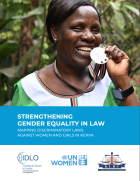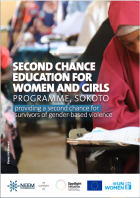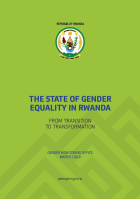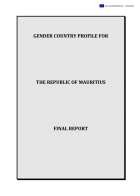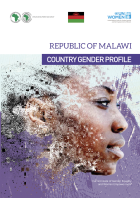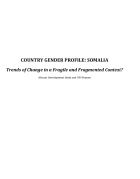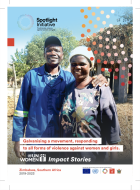1 - 20 of 27 Results
Pagination
Date:
The ultimate goal is that women and girls in Sudan benefit from gender-responsive humanitarian action and targeted assistance that responds to their basic needs, and from opportunities for their meaningful participation in peace, political and humanitarian processes.
Date:
This brief relies on data and findings from the Social Institutions and Gender Index (SIGI) report for Tanzania conducted in 2022, complemented by online literature. To empower women in other important areas, gender equality in the home and private spheres is essential. Nonetheless, discriminatory social norms and traditional roles are frequently the strongest and hardest to overcome within the home and family.
Date:
These are key messages developed from the Social Institutions and Gender Index (SIGI) report for Tanzania conducted in 2022.
Date:
Under the leadership of the Ministry of Gender, Child, and Social Welfare, in collaboration with the Ministry of Peace Building, and with support from UN Women and international funding, the Women’s Charter empowers women and girls to engage with the Reconstituted National Constitutional Review Commission (R-NCRC). Launched on May 29, 2024, in Juba, the Charter addresses twelve critical themes, advocating for comprehensive legal, policy, and programmatic interventions in the Permanent Constitution-making process.
Date:
Prioritizing Women's Peace and Security to achieve Gender Equality.
Date:
UN Women and International Development Law Organization (IDLO), in partnership with the Kenya Law Reform Commission. Researcher/writer: Dr. Consolata Ngondi; Ms. Petronella Mukaindo
Date:
Under the Joint UN-EU Spotlight initiative, the Second Chance Education center for Women and Girls, Sokoto, was established to ensure GBV survivors in Sokoto get a second chance at economic empowerment and basic education. This document highlights some of the human impact stories made by the Joint UN-EU Spotlight initiative in Sokoto
Date:
This publication highlights the progress and prevailing gender gaps in Rwanda so far as far as Gender Equality and Women's Empowerment is concerned. It also gives insights into the state of gender equality in the National Strategy for Transformation (NST1) pillars.
Date:
The Gender Country Profile publication for the Republic of Mauritius documents the progress achieved towards the attainment of gender equality and examines how far the Republic of Mauritius has been able to address gender gaps and empowerment of women in line with the various regional and international conventions ratified.
Date:
The Malawi Counrty Gender Profile publication presents a review of existing gender issues identified through a review of documents and reports recently released. The generic purpose of Country Gender Profile is to strengthen national understanding and data on the advancement of international, regional and national commitments towards Gender Equality and Women's Empowerment.
Date:
The publication presents a Country Gender Profile for Somalia examining core trends in gender and inclusion, new policies and legalisation, and institutional capacity to promote gender equality, particularly in a fragile and fragmented context, with change and progress assessed since 2012.
Date:
Galvanizing a movement, responding to all violence and discrimination against women and girls in Zimbabwe. After four years of programming in Zimbabwe, the EU-funded Spotlight Initiative has made milestones in ending all forms of violence and discrimination against women and girls. This story booklet captures voices of the programme beneficiaries and various stakeholders in all five programme districts across Zimbabwe.
Date:
Devolution has increased opportunities for women and other marginalized groups to participate and engage in county-level planning, budgeting, and implementation, and ensured an opportunity for county governments to integrate gender-responsive mechanisms in these same processes. The report synthesizes the impact on women and girls in devolved sectors of local government including education, health, agriculture, water and sanitation, and urban planning across the 14 counties of the United Nations Joint Devolution Programme.
Date:
This module is one of four reports developed on violence in Uganda and the survey is the first of its kind where VAWG, VAM and VAC estimates are linked to poverty and other household socio-economic empowerment indicators such as ownership of household-based enterprises, and other economic indicators.
Date:
It is a reality that our region carries the highest prevalence of child marriage and female genital mutilation in the world, impacting millions of our girls. These harmful traditional practices have devastating impact including loss of life, risk of disease such as fistula, loss of education and life opportunities, trauma and other psycho-social impacts resulting in deepening poverty and perpetuating a cycle of abuse. This calls on us as traditional and religious leaders to urgently assume our role as protectors of our children. The COVID-19 pandemic has further exacerbated the prevalence of genderbased violence in our countries and communities.
Date:
The UN Women WCARO annual report aims to share information about the regional office's activities on women empowerment and gender equality in 2020. The said year has been a particularly difficult year around the world with the COVID-19 pandemic. In West and Central Africa (WCA), women and girls were particularly vulnerable to the crisis. To counter these burdens and build medium and long- term recovery measures, the UN Women WCA Regional Office successfully provided multi-faceted assistance...
Date:
This publication highlights findings from the Zanzibar SDGs Gender Indicators Study in the form of infographics. The infographics showcase findings from each of the sectors covered in the report namely: Poverty and Hunger, Health, Decent Work, Quality Education, Gender Equality, Key Messages and the COVID-19 Context, and Recommendations.
Date:
The policy paper assesses the state of Gender Based Violence (GBV) in Africa in the context of the COVID-19 pandemic. Informed by evidence from the five African Union (AU) regions, it outlines some of the initiatives implemented in AU Member States. The paper also proposes recommendations towards multi-sectoral response and recovery efforts that address GBV as well as the related needs of women and girls in Africa.
Date:
This policy paper highlights the emerging lessons and key priority actions drawn from UN Women–led child marriage programs in Malawi and Zambia that will be instructive to existing and future interventions across Africa. The paper is also timely as it recognizes the need for deliberate actions to ensure that COVID-19 does not reverse the gains made to end child marriages in Africa.
Date:
Representation of a collection of marriage laws across African Member States developed in 2016 and updated in 2018 to serve as an updated compilation of Member States’ legal frameworks and legislation related to marriage. It was compiled through desk reviews of Member States’ legal frameworks, including: constitutions, civil codes, family laws and other partner documents and publications






